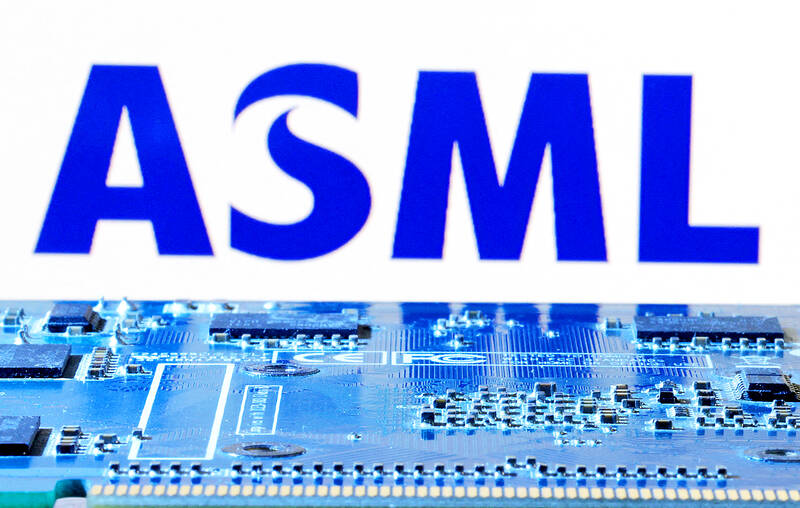Dutch tech giant ASML Holding NV, which supplies chipmaking machines to the semiconductor industry, yesterday reported a rise in annual net profit despite a high-tech trade spat between China and the West.
Net profits came in at 7.8 billion euros (US$8.5 billion) for last year, compared with 5.6 billion euros the previous year, the firm said.
“The semiconductor industry continues to work through the bottom of the cycle,” ASML Holding NV CEO Peter Wennink said in a statement.

Photo: Reuters
“Although our customers are still not certain about the shape of the semiconductor market recovery this year, there are some positive signs,” he added.
ASML is one of the world’s leading manufacturers of equipment to make state-of-the-art semiconductor chips, which power everything from mobile phones to cars.
However, the semiconductor industry has become a geopolitical battleground, as the West seeks to restrict China’s access over fears the chips could be used for advanced weaponry.
ASML earlier this month said that it had been blocked from exporting “a small number” of its advanced machines to China, amid reports of US pressure on Amsterdam.
At the time, Beijing lashed out at what it called “bullying behavior” by Washington, adding that it “seriously violates international trade rules.”
There are also concerns Beijing might introduce its own export controls on gallium and germanium — two rare earth metals critical for semiconductors.
ASML has shrugged off the financial impact of the geopolitical headwinds, with top officials saying the firm is well placed to weather the storm.
The company said it expects flat sales this year, which it has called a “transition year,” before registering “significant growth” next year.
Overall net sales last year came in at 27.6 billion euros, up from 21.1 billion euros in 2022.
The numbers for last quarter were also slightly better than the firm had expected, with profits of 2 billion euros on sales of 7.2 billion euros.
ASML said its pipeline was also robust, with net bookings nearly tripling to 9.2 billion euros in the fourth quarter compared with 2.6 billion euros in the previous quarter.
“Our strong order intake in the fourth quarter clearly supports future demand,” Wennink said.
However, net bookings were down for the year as a whole, at 20 billion euros compared with 30.6 billion euros in 2022.
The firm said sales in this quarter are expected to slow compared with the pace set in last quarter, with a forecast of 5 billion euros to 5.5 billion euros.
“In spite of the positive signs as described above, we maintain our conservative view for the total year and expect 2024 revenue to be similar to 2023,” Wennink said. “We also expect 2024 to be an important year to prepare for significant growth that we expect for 2025.”

KEEPING UP: The acquisition of a cleanroom in Taiwan would enable Micron to increase production in a market where demand continues to outpace supply, a Micron official said Micron Technology Inc has signed a letter of intent to buy a fabrication site in Taiwan from Powerchip Semiconductor Manufacturing Corp (力積電) for US$1.8 billion to expand its production of memory chips. Micron would take control of the P5 site in Miaoli County’s Tongluo Township (銅鑼) and plans to ramp up DRAM production in phases after the transaction closes in the second quarter, the company said in a statement on Saturday. The acquisition includes an existing 12 inch fab cleanroom of 27,871m2 and would further position Micron to address growing global demand for memory solutions, the company said. Micron expects the transaction to

Vincent Wei led fellow Singaporean farmers around an empty Malaysian plot, laying out plans for a greenhouse and rows of leafy vegetables. What he pitched was not just space for crops, but a lifeline for growers struggling to make ends meet in a city-state with high prices and little vacant land. The future agriculture hub is part of a joint special economic zone launched last year by the two neighbors, expected to cost US$123 million and produce 10,000 tonnes of fresh produce annually. It is attracting Singaporean farmers with promises of cheaper land, labor and energy just over the border.

US actor Matthew McConaughey has filed recordings of his image and voice with US patent authorities to protect them from unauthorized usage by artificial intelligence (AI) platforms, a representative said earlier this week. Several video clips and audio recordings were registered by the commercial arm of the Just Keep Livin’ Foundation, a non-profit created by the Oscar-winning actor and his wife, Camila, according to the US Patent and Trademark Office database. Many artists are increasingly concerned about the uncontrolled use of their image via generative AI since the rollout of ChatGPT and other AI-powered tools. Several US states have adopted

A proposed billionaires’ tax in California has ignited a political uproar in Silicon Valley, with tech titans threatening to leave the state while California Governor Gavin Newsom of the Democratic Party maneuvers to defeat a levy that he fears would lead to an exodus of wealth. A technology mecca, California has more billionaires than any other US state — a few hundred, by some estimates. About half its personal income tax revenue, a financial backbone in the nearly US$350 billion budget, comes from the top 1 percent of earners. A large healthcare union is attempting to place a proposal before